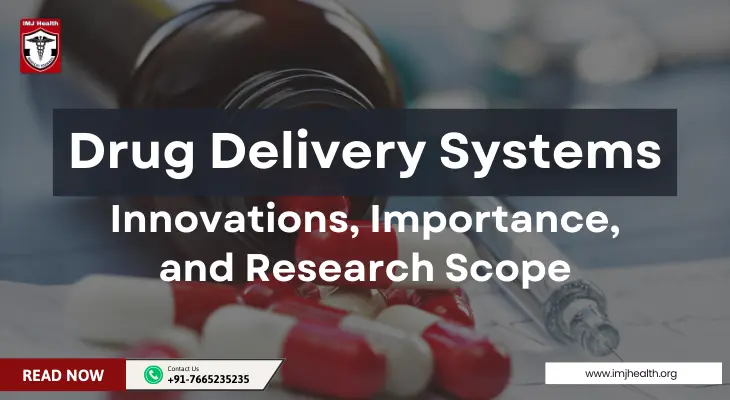Drug Delivery Systems: Innovations, Importance, and Research Scope

Drug delivery research is transforming modern medicine through nanocarriers, smart systems, and eco-friendly technologies. A PhD in this field offers opportunities to improve bioavailability, reduce toxicity, and explore novel administration routes. Graduates can pursue careers in academia, pharma, and biotech, making it one of the most future-proof research areas.
Drug delivery systems are one of the most dynamic fields in medical and pharmaceutical research. At their core, these systems determine how medicines are transported into the body so they can act effectively at the intended site. Traditional approaches like oral tablets and injections remain important, but science is now moving toward advanced, patient-friendly, and highly targeted drug delivery technologies. These innovations not only improve treatment outcomes but also shape the future of healthcare. This field is a key component of Innovations in Clinical Research.
What is a Drug Delivery System?
A drug delivery system refers to the method by which a therapeutic substance is administered to achieve the desired effect. The primary goal is to deliver the drug in the right dose, at the right place, and at the right time.
Traditional Methods:
- Oral medications (pills, capsules, syrups): Easy to use but sometimes have low absorption.
- Injections (intravenous, intramuscular, subcutaneous): Fast delivery but often painful and less convenient.
Modern & Advanced Methods:
- Nano-carriers – Tiny nanoparticles that can carry drugs directly to diseased cells (like cancer cells), reducing harm to healthy tissues.
- Transdermal Patches – Adhesive patches placed on the skin that release medication slowly and steadily.
- Inhalers and Oral Thin Films – Useful for respiratory diseases or fast absorption through the mouth.
- Smart Delivery Systems – These respond to biological cues such as body temperature, pH levels, or glucose concentration, releasing drugs only when needed.
Importance of Drug Delivery Systems Matter:
Advanced drug delivery systems solve many challenges faced in traditional medicine use.
- Better Effectiveness: Ensures the drug reaches the target site in optimal concentration.
- Fewer Side Effects: By avoiding exposure to unnecessary body parts, toxicity is reduced.
- Patient Comfort: Non-invasive options like patches or films make treatments more convenient.
- Controlled Release: Allows drugs to be released gradually over time, reducing the frequency of doses.
- Precision Medicine: Enables personalized therapy based on patient needs and conditions.
For example, cancer patients may benefit from nano-carriers that deliver chemotherapy drugs directly to tumor cells, minimizing harmful effects on healthy tissues. Similarly, diabetic patients may soon rely on smart insulin delivery systems that release insulin in response to blood sugar levels. These advancements are part of the broader trend in The Future of Medicine: Top 10 Trending Research Areas.

Current Challenges in Drug Delivery
Despite exciting progress, researchers face several hurdles:
- Bioavailability Issues: Ensuring the drug is properly absorbed by the body.
- Stability of Drugs: Some drugs break down quickly inside the body before reaching their target.
- High Costs: Advanced systems like nanotechnology are expensive to produce.
- Scalability: Moving from lab-scale research to mass production remains difficult.
PhD Scope in Drug Delivery Research
Drug delivery is no longer just about swallowing a pill or taking an injection—it's about precision, innovation, and patient-centered care. With continuous advancements in biotechnology, nanomedicine, and material sciences, PhD candidates have vast opportunities to contribute to life-changing research. Here are some of the most promising research directions for scholars considering a PhD in this field:
Improving Bioavailability
One of the biggest challenges in pharmaceutical sciences is poor drug absorption. Many promising drugs fail during development because they cannot reach sufficient concentration in the body. PhD research in this area focuses on:
- Formulating nanoparticles or liposomes to increase absorption.
- Designing prodrugs that convert into active drugs only after entering the body.
- Exploring enhancers or carriers that allow oral drugs to bypass the digestive breakdown process.
Such innovations can make difficult-to-deliver drugs, like cancer therapies or peptides, much more effective in real-world use.
Targeted Drug Delivery
Traditional drugs often affect both healthy and diseased cells, leading to severe side effects. Targeted drug delivery aims to solve this by using precision techniques such as:
- Nanocarriers that release drugs only inside tumors.
- Ligand-based targeting, where molecules like antibodies guide the drug to specific cell receptors.
- Magnetically or ultrasound-triggered delivery, where external forces control drug release.
PhD scholars in this area directly contribute to cancer therapy, neurological diseases, and chronic condition treatments, improving outcomes while reducing toxicity. For those interested in cancer research specifically, explore What's Next in Cancer Treatment? Advances Beyond Immunotherapy.
Minimizing Toxicity
Even highly effective drugs often come with toxic side effects. Research in this space works on reducing unnecessary exposure by:
- Developing controlled release systems that deliver medicine slowly over time.
- Designing compartmentalized carriers that protect healthy cells.
- Using biodegradable polymers that safely break down after releasing the drug.
This area of research ensures treatments are not only powerful but also safe for long-term use.
Smart & Personalized Delivery
The future of medicine lies in precision healthcare. Smart delivery systems are designed to respond to the body's unique environment. Examples include:
- pH-sensitive capsules that release drugs only in acidic tumor environments.
- Temperature or glucose-responsive systems, useful in conditions like diabetes.
- Integration of AI and wearable devices that monitor the body and trigger drug release as needed. Learn more about The Role of Artificial Intelligence in Medical Research.
PhD candidates in this domain help shape the future of personalized medicine, where treatments adapt to each patient's biology.
Alternative Routes of Administration
PhD research is also transforming how drugs enter the body. Beyond tablets and injections, scholars can explore:
- Nasal sprays and inhalers, especially for brain and respiratory diseases.
- Buccal or sublingual films, which dissolve under the tongue for fast action.
- Microneedle patches, offering pain-free and self-administered vaccinations.
These approaches make treatments more convenient, accessible, and patient-friendly, especially in low-resource settings.
Sustainable Drug Delivery
As sustainability becomes central in healthcare, research into eco-friendly drug delivery systems is gaining attention. Scholars are working on:
- Biodegradable polymers that reduce environmental waste.
- Plant-based or green nanotechnology for carrier development.
- Designing systems that minimize overuse of antibiotics and reduce drug pollution. This is connected to the critical issue of Antibiotic Resistance and New Treatment Approaches.
This area ensures that advancements in healthcare align with global sustainability goals.
Career Opportunities After PhD
A PhD in drug delivery systems opens doors across multiple sectors, including:
- Academic Research – Teaching and leading research labs in top universities. For those considering this path, see our guide on Top 10 Global Universities Leading Medical and Health Research.
- Pharmaceutical Innovation – Working in R&D departments of global pharma companies. Discover Top Pharmaceutical Journals for Publishing Research.
- Clinical Trials & Regulatory Affairs – Ensuring safety and effectiveness of new treatments.
- Biotech Startups – Innovating new drug delivery products for niche markets.
With healthcare moving rapidly toward personalized, efficient, and sustainable treatments, drug delivery research stands out as one of the most future-proof PhD specializations in medical and pharmaceutical sciences.
Drug delivery systems represent a revolution in modern medicine. By making treatments safer, more efficient, and patient-friendly, they play a crucial role in shaping healthcare outcomes. With ongoing innovations such as nano-carriers and smart delivery platforms, this field offers immense opportunities for researchers, healthcare providers, and patients alike. For aspiring PhD scholars, drug delivery research promises not only academic excellence but also the chance to impact millions of lives.
Frequently Asked Questions:
Q1. What is drug delivery research?
Ans: Drug delivery research focuses on designing and improving methods of transporting medicines into the body to maximize their effectiveness, minimize side effects, and improve patient comfort.
Q2. Why is a PhD in drug delivery important?
Ans: A PhD in drug delivery allows researchers to innovate in nanotechnology, personalized medicine, and advanced therapeutic systems, addressing challenges like poor bioavailability, toxicity, and patient compliance.
Q3. What are the career opportunities after a PhD in drug delivery?
Ans: Graduates can work in pharmaceutical companies, biotech startups, clinical research organizations, or pursue academic and teaching positions. Roles include research scientist, formulation scientist, regulatory affairs specialist, and R&D lead.
Q4. Which skills are required for a PhD in this field?
Ans: Key skills include knowledge of nanotechnology, pharmaceutics, biopharmaceutics, analytical techniques, polymer science, and research methodology. Critical thinking, innovation, and lab skills are also essential. For research methodology, see How to Write a Powerful Abstract for a Medical Research Paper.
Q5. What are the emerging trends in drug delivery research?
Ans: Some promising areas include nanocarriers for cancer therapy, microneedle patches for vaccines, biodegradable drug systems, and smart drug delivery platforms that respond to biological signals like pH or temperature.
Q6. Is drug delivery research a good career option?
Ans: Yes. With increasing demand for targeted, effective, and safe medicines, drug delivery research offers strong prospects in academia, industry, and healthcare innovation, making it a future-proof specialization. It's also a great topic for a thesis; explore Top 10 Pharmaceutical Research Topics for PhD.
Related Research Areas
Explore these connected fields to broaden your understanding of pharmaceutical and medical research:
- Top 10 Pharmaceutical Research Topics for PhD - Discover other promising areas in pharma research.
- Innovations in Clinical Research: From Medicines to Surgical Methods - See how drug delivery fits into broader clinical advances.
- The Role of Artificial Intelligence in Medical Research - Learn how AI is transforming drug discovery and delivery.
- Top Pharmaceutical Journals for Publishing Research - Find the best platforms to publish your findings.
- How to Apply for PhD Scholarships Worldwide - Secure funding for your advanced studies.
Contact Medical Journal: IMJ Health:
- Website: www.imjhealth.org
- Editor-in-Chief: Dr. Kusum Lata Gaur | MBBS, MD(PSM), CIC (IGNOU), PGCHFWM
(NIHFW) (WHO Fellow IEC)
Professor, PSM & Member of Research Review Board | SMS Medical College, Jaipur (Rajasthan) India - Editor-in-Chief Email ID: info@imjhealth.org
- General Support Email: info.imjh@gmail.com
- Contact us on WhatsApp: Chat Now : +91-7665235235
If you are working on drug discovery, clinical trials, or pharmaceutical technology, consider submitting your research to IMJ Health to reach a wider audience and make an impact in the field of medicine.

 October 2025 Articles
October 2025 Articles Submit Article
Publication Fee
Research Areas
Guidelines for Authors
Process of
Publication
Journal Importance
Journal Indexing
Journal Polices
Digital
Identification Number
FAQs
Submit Article
Publication Fee
Research Areas
Guidelines for Authors
Process of
Publication
Journal Importance
Journal Indexing
Journal Polices
Digital
Identification Number
FAQs
| Citation Indices | All | Since 2019 |
| Citation | 280 | 209 |
| h-index | 7 | 7 |
| i10-index | 3 | 1 |
| Acceptance Rate (By Year) | |
| Year | Percentage |
| 2024 | 8.17% |
| 2023 | 10.84% |
| 2022 | 9.14% |
| 2021 | 11.26% |
| 2020 | 11.8% |
| 2019 | 10.3% |
| 2018 | 8.65% |
| 2017 | 12.9% |
| 2016 | 10.9% |
| 2015 | 12.5% |